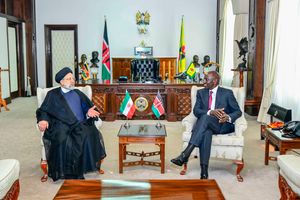The untold struggles of military wives

Norah Chebet Keitany wife to the late Col Duncan Keitany who died in a military chopper crash, speaks during an interview at their home in Ongata Rongai, Kajiado County on April 23, 2024. Not much is written on the experiences of wives of military men and how they cope with loss.
What you need to know:
- Military wives find themselves catapulted into the double roles of father and mother when their spouses are out on a mission.
- They develop chronic psychosomatic illnesses and do not know how to respond to their own children’s emotional needs.
- One significant difficulty is that of children defying their fathers, having grown up under the mothers and now being subjected to a masculine authority.
That the military is male-dominated means that casualties of warfare and other military tragedies are mostly men. This raises gender-related questions. What happens to the significant others they leave behind, especially their wives? Even without death, how do the wives cope with the knowledge that every time the husband is deployed, it could possibly be the last time she’s seeing him alive?
The recent sudden death of Kenyan soldiers (of whom one was a woman), including the Chief of Defence Forces, General Francis Ogola, make these issues pertinent. While the country was mourning departed soldiers, someone was mourning a husband, a personal confidante and companion.
Not much is written on the experiences of wives of military men. The few studies on the subject also do not dwell on how wives cope with loss. But they give an idea of what it means to be the wife of a soldier.
In Military Wives’ Transition and Coping: Deployment and the Return Home, Suzanne Marnocha (2012) explores the experiences around three cycles - Phase One (news of deployment), Phase Two (during deployment) and Phase Three (after deployment).
Unfinished projects
The study established that in phase one, emotional chaos was dominant, characterised by anxiety and anticipation of separation and loss. The wives found themselves catapulted into the double roles of father and mother. The men themselves became paranoid and would struggle to complete unfinished projects and earn extra income so as to feel that they left the families comfortable. The military itself directed the wives to get spiritual counselling about death and to discuss such a grim subject head-on.
In phase two, five themes emerged. First, the wife assumed the husband’s family roles, resulting in a feeling of being “overwhelmed, aggravated, and disorganised”, especially with young children to support. But this increased workload was also a blessing in that it distracted them and stabilised their emotions. Second, some adopted an avoidance strategy of not watching or listening to news about warfare lest it confirm their fears.
Third, they developed chronic psychosomatic illnesses and did not know how to respond to their own children’s emotional needs. This included difficulty in explaining where the fathers were and why they were perpetually absent. Fourth, the wives had to become stoic, as no amount of crying would change the fact of deployment, a function of the career the men had committed themselves to. Fifth, they had to adopt support systems such as keeping in constant touch with similarly affected women and families. Even though they were connected to their husbands through scheduled short phone calls and email messages, these did not quite fill the gap of loneliness. Some resorted to a prayerful life.
Financial accountability
The final phase is characterised as “a period of instability, confusion, and distress, (due) to an eventful ending with a new beginning or a period of stability”. The over-riding theme reported was that “absence makes the heart grow fonder”, resulting in fortified intimacy and a higher appreciation of each other. Yet, this phase also came with its own challenges of re-adjustment of physical and social space, re-organisation of roles and conflicts over financial accountability. One significant difficulty was that of children defying their fathers, having grown up under the mothers and now being subjected to a masculine authority.
A more recent study in the US titled The Military Spouse Experience: Current Issues and Gaps in Service - Rapid Literature Review by Clearinghouse Technical Assistance Team (2021) shows that “the top three issues that active duty military spouses encounter are (un)employment, (husband’s) time away from family, and children’s education”. It notes that “military-connected children, on average, change schools six to nine times from kindergarten through 12th grade”, due to frequent relocations of the fathers.
Closer home, the travails of military men are artistically explored in the poetry anthology Echoes of Military Souls by Jerusha Kananu Marete. This collection examines the themes of anxiety, physical and emotional loneliness, expectation and excitement.
Multiple support
It looks at the desolation of parents, widows and orphans. In one poem, it talks about suicidal ideation and actual suicide out of a husband who returns home to find his wife in the arms of another man right inside the matrimonial bedroom. While the soldier takes away his life, the wife lives with stigma and trauma that consigns her to a life of alcoholism.
In short, being the wife of a military officer is psychologically demanding, which calls for multiple support – from the military itself, the family, spiritual entities and health and wellness professionals. As this gets done, it is imperative to carry out local studies on the gender dimensions of military life not just from the soldiers’ perspectives but also those of their spouses.
The writer is a lecturer in Gender and Development Studies at South Eastern Kenya ([email protected]).





